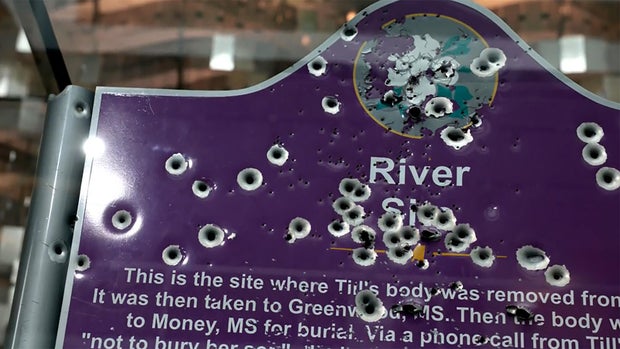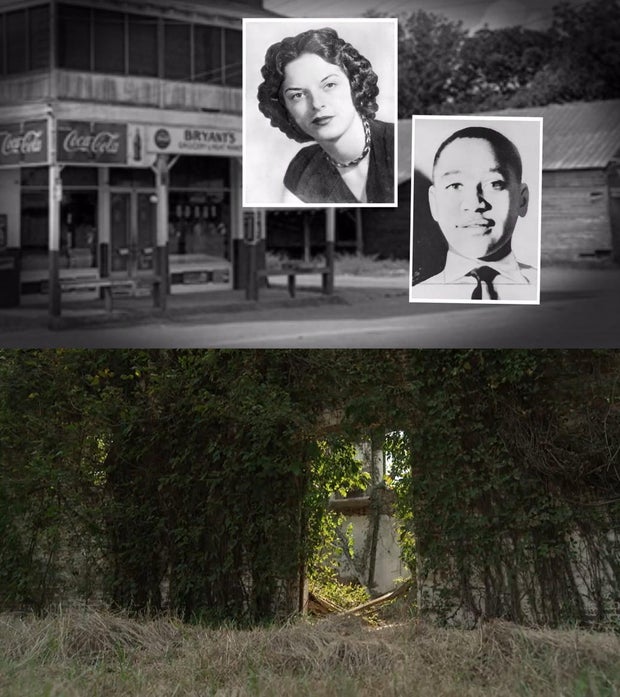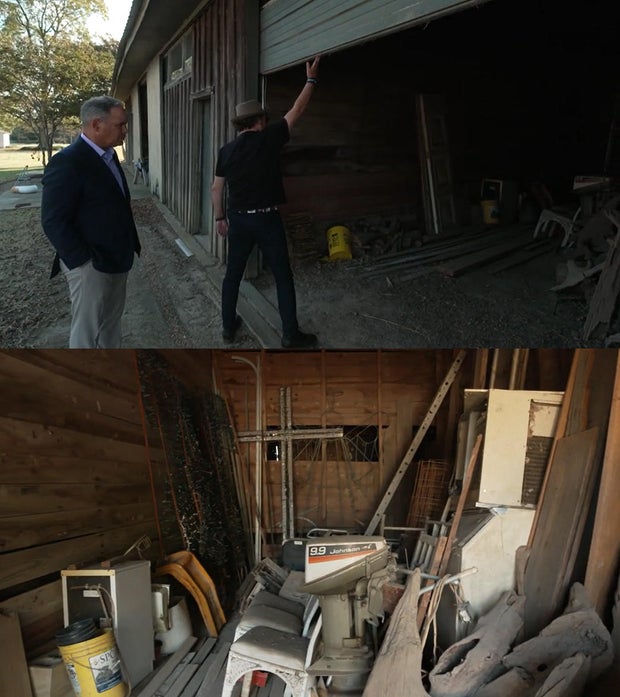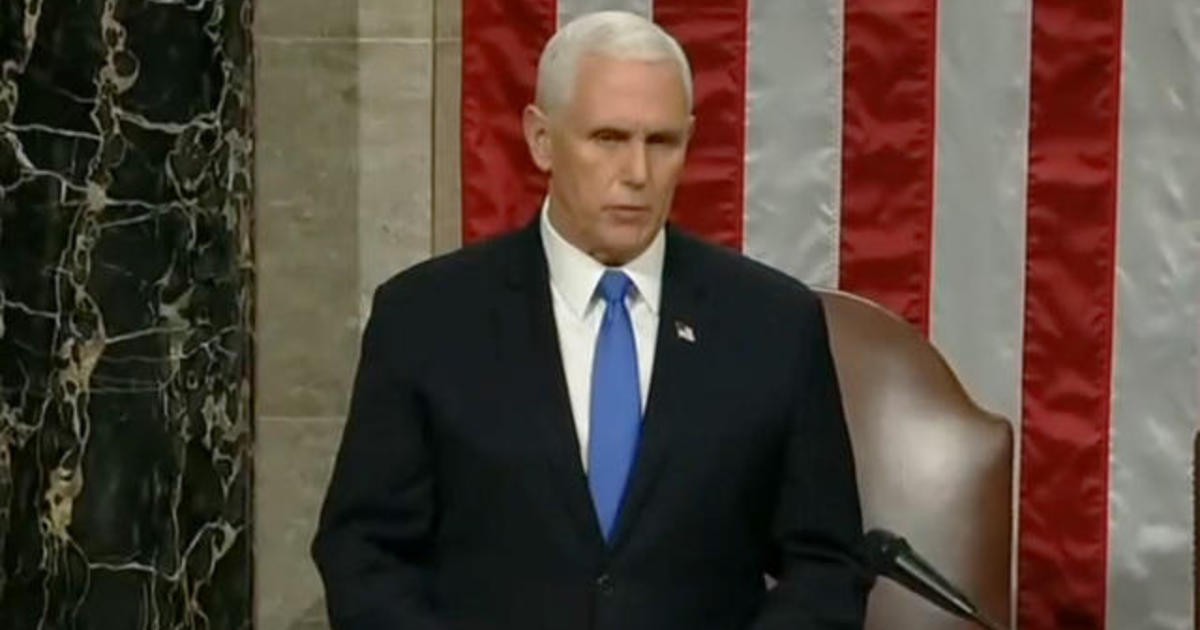CBS News
“The Barn,” on the lynching of Emmett Till, and an evil hiding in plain sight

If you know where to look in the Mississippi Delta, you can find markers of what a culture has spent decades trying to erase.
This plaque at the Tallahatchie River – replaced every now and then every time it’s been riddled with bullets – marks the spot where young Emmett Till’s brutally-beaten body was pulled from the water, a cotton gin fan wrapped around his neck, secured with barbed wire.
CBS News
The country store where Till whistled at a white woman – this 14-year-old boy’s “capital offense” – is being reclaimed by nature, soon to disappear entirely. The vines growing over it, says author Wright Thompson, are “the perfect reflection of the erasure, and of the attempt to pretend like none of this happened.”
CBS News
But at the very spot where this lynching unfolded nearly 70 years ago – nothing. Every day, people drive by a barn just outside Drew, Mississippi, with no idea what they are passing – a place where the worst thing imaginable happened inside. And that, said Thompson, is the point.
In his new book, “The Barn: The Secret History of a Murder in Mississippi” (published by Random House), Thompson, who is also a fifth-generation Mississippi Delta cotton farmer, examines what he calls evil hiding in plain sight. “Like almost every person in Mississippi or even in America, I didn’t know about the barn,” he said. “If I didn’t know something that essential about the place that I think I know best in the world, then something was deeply, fundamentally wrong.”
Random House
Mississippi in the summer of 1955, when Emmett Till visited relatives, was a different world for this kid from Chicago. Unfamiliar with the ways of the Delta, he had no idea the price to pay for aiming his whistle at the woman working at the store. “He whistled at sundown on a Wednesday, and he got taken at 2:30 a.m. on Sunday,” said Thompson.
An 18-year-old sharecropper named Willie Reed was out walking by the barn when a truck turned in. He hid while the woman’s husband and brother-in-law, who’d snatched Till from his bed, dragged the boy into the barn. “And he heard screams, turned to whimpers, turned to silence,” Thompson said. Reed went home, “and everybody in his life said, ‘Don’t say anything. Don’t you say anything.'”
Instead, Reed summoned all of his courage and walked into a courtroom to accuse two white men, J.W. Milam and Roy Bryant, of murder.
Asked why he’d ignored warnings about keeping quiet, Reed’s widow, Juliet, said, “I guess it was just something about Willie, that he wanted to do right.”
While the open casket Till’s mother, Mamie, insisted upon sparked outrage that fueled the civil rights movement, without Willie Reed’s bravery, no one would’ve ever been charged. “It was an all-white jury,” said Juliet, “and the jury was laughing while [Willie] was testifying.”
Bryant and Milam were acquitted. Reed would have to flee to Chicago, and change his name. Juliet said he remained haunted by the screams he’d heard until the day he died.
Thompson said, “Everybody who did the right thing in this case had their lives deeply affected, if not ruined. And the people who did the worst of it walked away free.”
That injustice is what Thompson says needs illumination in the Delta, where the instinct has always been to keep it shrouded.
In 1965, Gloria Dickerson integrated the schools in Drew, just a few miles from where Till was murdered. Schools made no mention of Till’s death when she was growing up, and today, Till’s murder only merits 117 words – one paragraph – in the Mississippi history textbook used today. “In Mississippi, they’re not gonna learn about what happened to Emmett Till,” Dickerson said. “It’s like the past was being erased.”
She combats that erasure through a program, We2Togther, that teaches kids in Drew the history her parents made sure she learned as a child. “When we would pass that barn, my mom would say, ‘That is where Emmett Till was killed,'” Dickerson said.
She says all children need to be taught that history: “Every kid; the Blacks need it, and the whites need it, too.”
While Tallahatchie County apologized to the Till family in 2007, and a statue was unveiled in 2022, the legacy of silence remains powerful there.
Rev. Willie Williams, who helps run the Emmett Till Interpretive Center (a non-profit dedicated to Till’s memory), said he didn’t know anything about the barn; his first visit there was two years ago, when he was in his 60s. “I’m in high school, when I found out this [was] the store where Emmett whistled at a white lady. And I grew up in the Delta.”
He believes not talking about what happened at Bryant’s Grocery & Meat Market, and the barn, was an attempt to erase history.
Today, at the barn where Emmitt Till was lynched, you’ll find the most mundane items of everyday life: An outboard motor. Driftwood from the river. Christmas decorations. A cross.
CBS News
The barn – owned by a man who let “Sunday Morning” visit, but didn’t want to talk, and who is negotiating to sell it to Rev. Williams’ non-profit – is where the paradox hits hardest: the ordinary building so many see, concealing extraordinary evil no one knows. And that, says “Barn” author Thompson, is why he’s dug so deep, so that if the erasure continues, no one can say “We didn’t know.”
“It’s the not knowing that we’re combating,” he said. “Silence and erasure are just different words for the same thing.”
READ AN EXCERPT: “The Barn: The Secret History of a Murder in Mississippi” by Wright Thompson
For more info:
Story produced by Jon Carras. Editor: Mike Levine.
See also:
CBS News
Ambassador Oksana Markarova says Ukraine is “not asking for other troops”

Watch CBS News
Be the first to know
Get browser notifications for breaking news, live events, and exclusive reporting.
CBS News
Sen. Amy Klobuchar says presidential pardon process “cries out for reform”

Washington — Sen. Amy Klobuchar, a Minnesota Democrat, said Sunday that the entire presidential pardoning process “cries out for reform” following some controversial commutations and pardons made by President Biden, including when the president issued a blanket pardon of his own son, Hunter.
“This whole process cries out for reform because otherwise you undermine the justice system,” Klobuchar said on “Face the Nation with Margaret Brennan.”
The White House announced early Thursday that President Biden was commuting the sentence of nearly 1,500 people, marking the widest reaching clemency granted by a president in a single day. Among the individuals, many of whom had been placed on home confinement during the COVID-19 pandemic, were some who have sparked controversy in recent days — including a judge involved in a so-called “Kids for Cash” scheme.
Klobuchar interjected that she “did not like that one,” adding that she did not agree with all the pardons and commutations.
“I have no doubt there were some righteous pardons in this group,” Klobuchar said. “But there were a number that I think make no sense at all.”
CBS News
Further, she said she didn’t agree with Mr. Biden’s pardon of his son, Hunter, earlier this month.
Klobuchar noted that she has also disagreed with a number of pardons that President-elect Donald Trump made during his first term. And the Minnesota Democrat said that while the pardon ability is part of the Constitution and has a long history that she said wouldn’t be changed, she would advocate for reforms.
“We should have some kind of an outside board that governors have,” she said. “Governors have the ability to give mercy to people after years have gone by, but a lot of them have boards that make recommendations and other things, instead of people just doing it in the middle of the night.”
Klobuchar suggested that over a year-long period, a board could look at individual petitions rather than large groups, which she argued undermines the work of FBI agents and prosecutors who took on the cases.
“Might you want mercy 10 years later?” Klobuchar said. “Yes, you might. But let’s at least look at these on a factual basis and a risk basis, instead of just in the middle of the night a month before a president leaves.”
CBS News
12/15: Face the Nation – CBS News

Watch CBS News
Be the first to know
Get browser notifications for breaking news, live events, and exclusive reporting.










